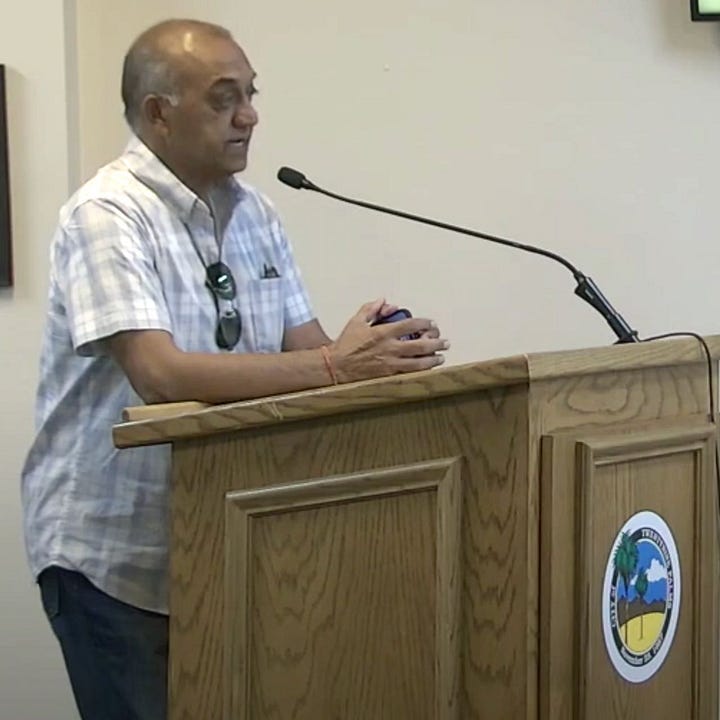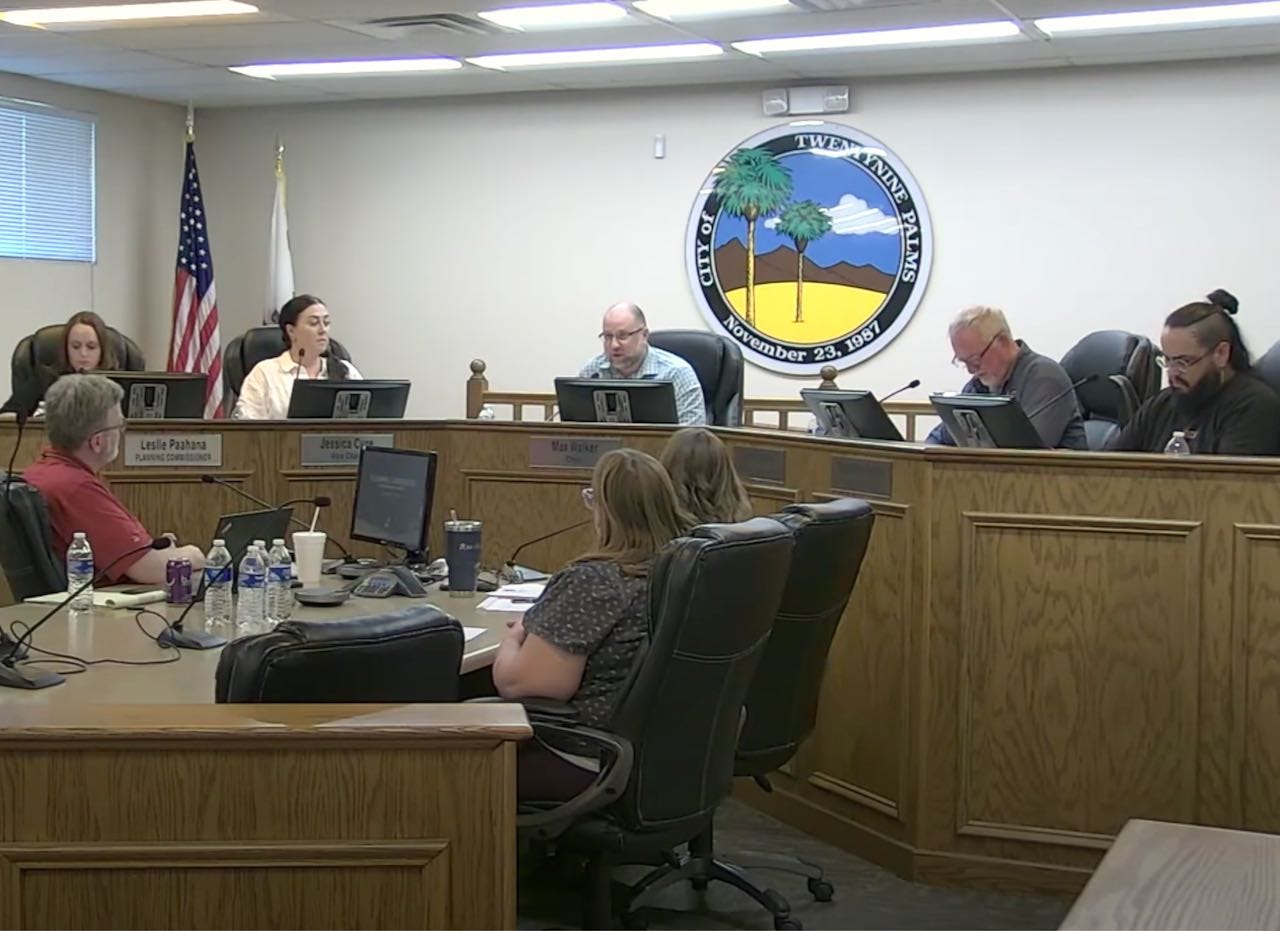RECAP: Planning Commission Meeting, September 17, 2024
Planning Commission cuts camera and comments for "study session" on Entertainment Permits; Chair Max Walker announces an out of state move
The Twentynine Palms Planning Commission emerged from summer break on Tuesday, conducting their first meeting in a month after having spent barely 100 minutes on the dais since May 21st. All Commissioners were present for a one-topic agenda, which produced a circular discussion on Entertainment Permits that stretched for more than an hour. Our agenda preview is here.
General public comment was brief, with Public Art Advisory Committee (PAAC) Chair Anna Stump announcing that Entertainment Permits would be discussed at the PAAC’s meeting the next evening on September 18. Veno Nathraj revealed that Chair Max Walker would be leaving his position on the Planning Commission and commended him for his service and for being a good parent.


PUBLIC COMMENT ON ENTERTAINMENT PERMITS IS DISALLOWED…FOR SOME
During announcements, Chair Walker made the surprise declaration that the live stream camera would be turned off for the study session on Entertainment Permits and that the Planning Commission would not be taking public comments on the agenda item because “it is a study session.”
While the public interest is served by the City recording or live streaming meetings, they are not legally obligated to do so. However, the Brown Act does not distinguish between meetings and study sessions or workshops when it comes to public comment. To deny public comment on an agenda item is a violation of the Brown Act and illegal.
When asked where the decision to silence public comment and turn off the camera came from, Walker replied:
I have not been given that information. That's just kind of what we decided to do. It was kind of a group, Keith and I, decision. So City Attorney, well, the City Attorney as well, because nothing we talk about in the study session is official. it's just things we're talking about. They're working through them—it's for us to help and understand the issue, and that's it. So it doesn't need to be recorded because there's no decisions being made from this meeting or anything like that. That's what I said in my announcements.
Chair Walker told the public that they could email their comments to the staff in lieu of making them at the meeting. Yet, despite denying the right to comment to those who sought to turn in their slips, Walker still unwittingly took two public comments on the Entertainment Permit agenda item. He read a letter from Susan Peplow into the record and allowed City scion and ex-Mayor Jim Bagley to speak on the agenda item in general public comment after have just read the instructions, “Public comments on specific agenda items will be deferred until consideration of the item on the agenda.”
Bagley spoke to noise levels from local entertainment becoming unreasonable, specifically calling out Kitchen in the Desert, Fans Sports Bar, and STRs in his neighborhood, as well as pointing out not being able to participate in the public study session:
What I would like you to do in the study process—there needs to be some limit on the volume. I don't want to tell people they can't have live music, but if you're blasting it into the night, and it's the volume where I can hear it in my house, your right to do that ends where my right to have peace and quiet…When I say I lived in LA, I live here because it's a small town. I don't live in Santa Monica. I don't live in LA. If people want to bring that out here and change the character of the town, I'm going to tell you to go back to LA, because that's what I want. If it’s not going to be a public process where I can participate, I just want to lay that on the table.
CHAIR MAX WALKER IS HEADING TO PORTLAND
During Commission announcements, Chair Max Walker confirmed that he was indeed stepping down from the Planning Commission:
October will be my last meetings with the council. I have taken a job in Portland, and I am moving back to back home to Portland, so at the conclusion of our second meeting in October, I will be resigning my seat on the Planning Commission.
With that, Chair Walker presided over the approval of the minutes and directed the camera to be turned off.
THE COMMISSION DISCUSSES ENTERTAINMENT PERMITS
The discussion centered around the four questions outlined in our agenda preview and although it meandered, we have organized comments under the appropriate query.
“Live Entertainment” Definition
Three examples from other cities were presented by Economic Development Director Gardner, who noted that Palm Springs does not define live entertainment:
Desert Hot Springs: …a musical act (including karaoke), theatrical act (including standup comedy), play, revue, scene, dance act, or combination, performed by 1 or more persons, whether or not they are compensated for the performance, in a privately owned premises that is open to the public, whether or not admission is charged.
Riverside: Entertainment means any single event, a series of events, or an ongoing activity or business, occurring alone or as part of another business, to which the public is invited or allowed to watch, listen, or participate or that is conducted for the purposes of holding the attention of, gaining the attention of or diverting or amusing guests or patrons, including, but not limited to:
Presentations by single or multiple performers, such as hypnotists, mimes, comedians; musical song or dance acts, karaoke, plays, concerts, any type of contest; sporting events, exhibitions, carnival, rodeo or circus acts, demonstrations of talent; shows, reviews and any other such activity which may be attended by members of the public.
Dancing to live or recorded music.
The presentation of recorded music played on equipment which is operated by an agent or contractor of the establishment, commonly known as a "DJ" or "disc jockey." Entertainment does not include ambient music provided through the use of a radio, stereo, jukebox, music recording machine, or other similar device.
Yucca Valley: A musical, theatrical, dance, cabaret, or comedy act performed by one or more persons. Any form of dancing by patrons or guests at an eating and drinking establishment or bar is live entertainment. Live entertainment does not include the term "adult entertainment facility" or "adult entertainment establishment."
Decision pending further discussion: Commission consensus landed on a definition of live entertainment similar to Desert Hot Springs.
Policies and Procedures for Live Entertainment
Ancillary vs Primary
Most of the discussion on this topic, and in the meeting, revolved around occupancy and when entertainment normally considered ancillary (or secondary) to a location’s primary business becomes something that might require separate permitting. For example, a guitarist entertaining diners in a restaurant under that business’s established occupancy limit is considered ancillary. But the Commission wondered if all the chairs and tables were cleared away for a special performance where the number of people would exceed the occupancy limit, wouldn’t that require a permit?
Various ideas were raised regarding ancillary entertainment including that it would fall under the one and done permit that was tossed around at the City Council meeting, would be attached to the existing license or business license renewal, or would be permitted separately with its own renewal every two years.
As Gardner explained:
The idea here is we would have a running inventory of the the establishments that are approved for live entertainment, what their capacity is, and what days of the week, or whatever rules we establish…indoor, outdoor, etc, and when they have to close down. So we just have that.
Commissioner Jessica Cure added that entertainment with attendees exceeding established occupancy would just be a temporary permit. Gardner went on to say that the challenge in Twentynine Palms is there are very few event centers or businesses that would be considered “primary” in which their principal operation is live entertainment—Theatre 29 being one of the few examples. Later in the meeting Assistant Planner Diane Olson clarified that there are only two businesses with entertainment permits. She didn’t mention which businesses those were.
Decision pending further discussion: Three types of entertainment classes (and potentially permits): “primary” for businesses whose primary purpose is live entertainment; “ancillary” for businesses whose primary purpose is not live entertainment but which often have an entertainment component within their established occupancy to support their primary business; “special” (or temporary) for larger events and events that are not ancillary and exceed established occupancy.
Permit / License Process
There was limited consideration of this item, usually embedded within the discussion of ancillary / primary definitions, but no concluding consensus.
Similar to “Permit / License Process,” other topics listed under Policies and Procedures by Gardner such as “Involvement with Law Enforcement / Fire Protection,” “Types of existing establishments,” and “Life of Permit / License” were brought up in passing without substantive discussion at this meeting. Also not discussed were “Changes to the Development Code” and “Enforcement / Violations.”
The “Live Entertainment” discussion will be continued by the Planning Commission as well as the PAAC and the Tourism Business Improvement District (TBID) in addition to meetings with City businesses.
Leave your thoughts in the comments below. Please note that we do not allow anonymous comments. Please be sure your first and last name is on your profile prior to commenting. Anonymous comments will be deleted.
Feel free to share this article!
Many communities in the Morongo Basin are economically disadvantaged, so our coverage will always be free. However, if you have the means to support our work, we always appreciate upgrades to a paid subscription. Your upgrade helps keep subscriptions free for those who cannot afford to donate.
Note that donations in excess of $100 are tax deductible to the extent allowed by law, and your subscription/donation will be listed as AHA Projects, the name of our fiscal receiver, on your statement. Donations over $100 can be made via the Aha Paypal.




Normally I do not respond to the articles of a "blog", but the misrepresentation of this writing compelled me to respond.
Yes, according to the Brown Act, the public gets to comment on agenda items, even Study Sessions. However, the Planning Commission (or other governing body) can impose reasonable conditions on time allowed and when those comments are received. In this case, Chairman Walker had comments received in conjunction with the Public Comments portion of the meeting. During which Ms. Susan Peplow’s emailed comments were summarized by Chairman Walker and Mr. Jim Bagley made his comments concerning live entertainment and noise issues. Furthermore, Chairman Walker offered that any resident could email questions or comments concerning the Live Entertainment issue to City Staff and a reasoned response would be provided. This ensured the public’s right to participate while still allowing flexibility on how comments are received. In addition, the Study Session was held in City’s Council Chamber where any member of the public could observe the discussion. The Study Session is where the Planning Commission and City Staff, working together, can have initial discussions on the issue and plan a course of action. Chairman Walker and the Planning Commission met the spirit and letter of the law.